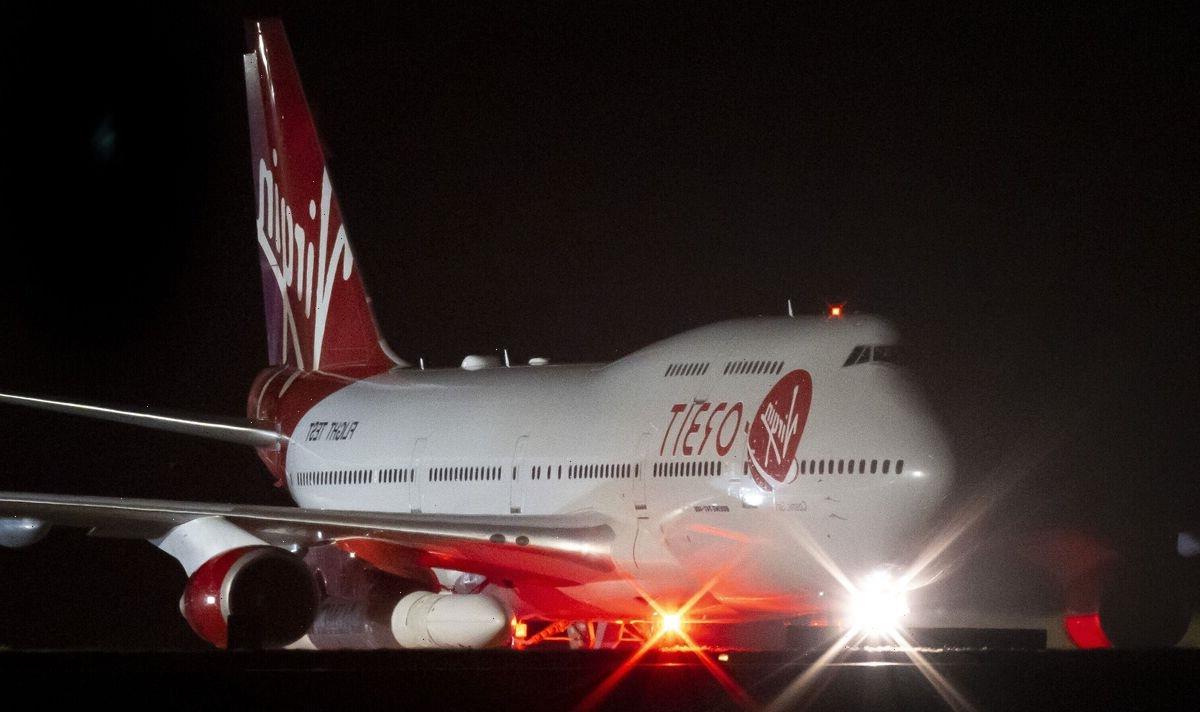Start Me Up: Virgin Orbit rocket takes flight from Cornwall
We use your sign-up to provide content in ways you’ve consented to and to improve our understanding of you. This may include adverts from us and 3rd parties based on our understanding. You can unsubscribe at any time. More info
Virgin Orbit has begun investigating the failure of yesterday’s rocket launch — but have vowed to “return to orbit” as soon as the root cause has been identified and corrected. The initial stages of the so-called Start Me Up mission went smoothly, with the Cosmic Girl, the 747 airliner converted into a launch platform. It took-off from Spaceport Cornwall with the 70-foot-long LauncherOne rocket under its wing and was then released above the Atlantic Ocean. It initially appeared to be on course for success, with the second stage igniting and the rocket reaching space.
However, just before midnight last night as Virgin Orbit tweeted that “we appear to have an anomaly that has prevented us from reaching orbit. We are evaluating the information.” Express.co.uk has approached Virgin Orbit for comment on their future plans for launches from UK soil.
While Cosmic Girl — piloted by RAF Squadron Leader Matthew Stannard — safely returned back to Spaceport Cornwall, LauncherOne ultimately fell back towards Earth, burning during atmospheric reentry.
Lost with it was the rocket’s payload of satellites which were intended to be placed into orbit on behalf of seven different commercial and governmental customers for several nations. It is understood that the satellites were insured, and thus their manufacturers and operators will be compensated for their loss.
This is the first time that a LauncherOne mission bearing payloads for other organisations has failed to successfully deliver such to orbit as promised. While it is unclear when Virgin Orbit will be in a position to attempt another mission with their Cosmic Girl/LauncherOne system, the UK Space Agency have said that this year will nevertheless see more rockets launched from British soil.


These, however, will be of the traditional, vertical variety — with both Skyrora and Orbex looking to launch missions from Scotland later this year. Virgin Orbit CEO Dan Hart said: “While we are very proud of the many things that we successfully achieved as part of this mission, we are mindful that we failed to provide our customers with the launch service they deserve.
“The first-time nature of this mission added layers of complexity that our team professionally managed through; however, in the end, a technical failure appears to have prevented us from delivering the final orbit.
“We will work tirelessly to understand the nature of the failure, make corrective actions, and return to orbit as soon as we have completed a full investigation and mission assurance process.”
Spaceport Cornwall head Melissa Thorpe has said that the outcome of yesterday’s mission left her “absolutely devastated”. She added: “We are so incredibly proud of everything we have achieved with our partners and friends across the space industry here in the UK and in the US. We made it to space — a UK first.


“Today we inspired millions, and we will continue to look to inspire millions more, not just with our ambition but also with our fortitude. Yes, space is hard — but we are only just getting started.”
The UK Space Agency’s Director of Commercial Spaceflight, Matt Archer, said: “We have shown the UK is capable of launching into orbit, but the launch [last night] was not successful in reaching the required orbit.We will work closely with Virgin Orbit as they investigate what caused the anomaly in the coming days and weeks.
“While this result is disappointing, launching a spacecraft always carries significant risks. Despite this, the project has succeeded in creating a horizontal launch capability at Spaceport Cornwall, and we remain committed to becoming the leading provider of commercial small satellite launch in Europe by 2030, with vertical launches planned from Scotland.”
Speaking on ITV’s Good Morning Britain earlier, Secretary of State for Business, Energy and Industrial Strategy Grant Schapps said: “We’ll be doing a lot of post-mortems to find out exactly what happened. Space is inherently difficult.”
DON’T MISS:
Flybe apologises as airport shuts ahead of first UK space launch [REPORT]
Households resort to burning cat litter due to wood pellet shortage [INSIGHT]
AI robot can ‘sense anxiety’ and talk about how the world will end [ANALYSIS]

The MP stressed that while money has been invested in the infrastructure at Spaceport Cornwall — which will serve future launches — last night’s mission itself was privately funded and its failure does not come at a cost to the taxpayer.
Mr Schapps remains optimistic about Britain’s role in the space industry going forward. He said: “People may not know this [but] the UK produces more satellites than anywhere outside of California.
“If we can crack the ability to launch these satellites as well, that’s a lot of industry, that’s a lot of jobs created. So, it’s something we’re very keen to do and I’ve no doubt we’ll be back.
“We’re looking for up to seven different launch sites in the UK — vertical as well as horizontal — over the next few years.”
Source: Read Full Article
